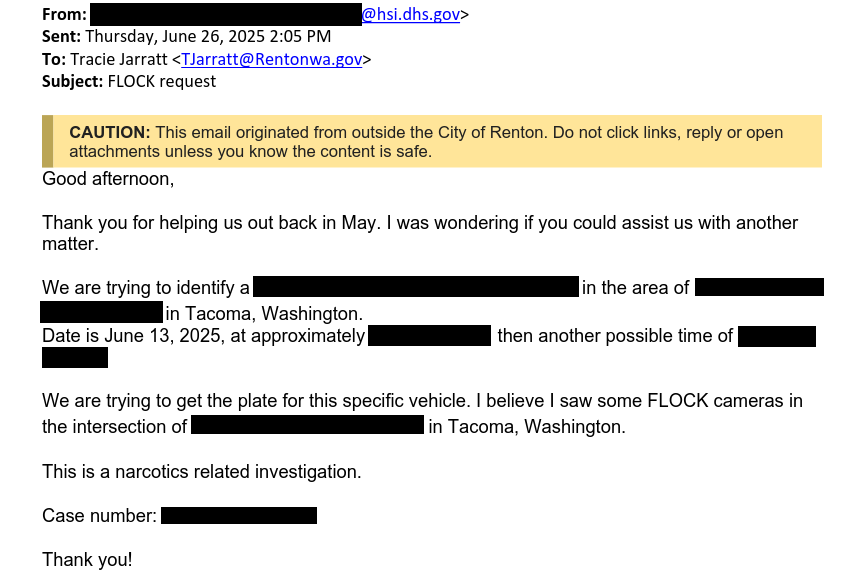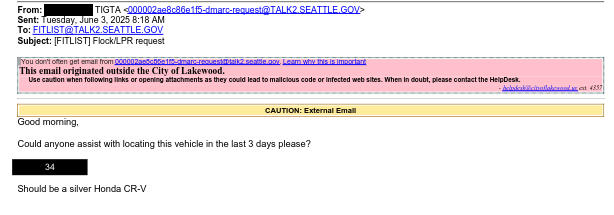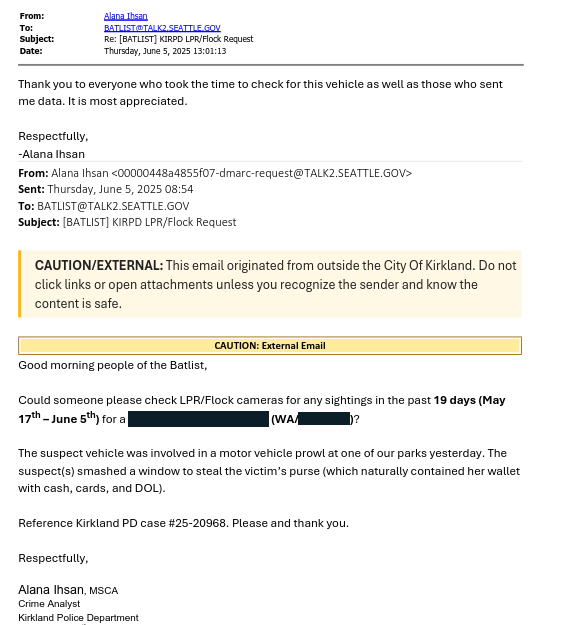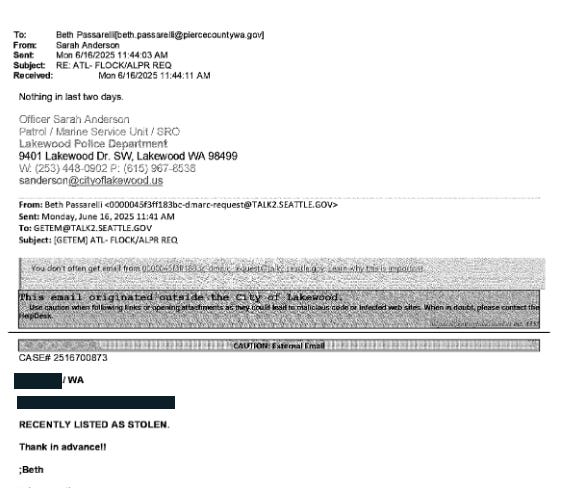Feds, WA police share surveillance data on an obscure SPD email list
As civil liberties groups warn that surveillance info can wind up in the wrong hands, the Seattle Police Department is already hosting a space for sharing data with little oversight.
Guest post by Rose Terse
Seattle City Council will likely vote to expand real-time video surveillance on Sept. 9 despite dire warnings from civil liberties advocates about how footage will be shared and used. Meanwhile, state and federal officers, including ICE investigators, are already exchanging information and requests for Flock license plate searches on a little-known Seattle police email list.
Flock Safety, an Atlanta-based surveillance company, produces automated license plate readers and a platform for law enforcement to search cameras connected to their networks. Flock has been implemented in at least 80 Washington cities, and the company’s ALPR cameras are a core component of Seattle’s Real-Time Crime Center.
The tech firm faced backlash earlier this year after 404 Media revealed that police departments nationwide used its platform to run license plates for immigration and abortion cases, including in places like Washington with sanctuary and abortion shield laws.
And last week, Flock paused its federal data-sharing pilot after an audit found that Customs and Border Patrol violated Illinois state law by using the company’s platform to conduct searches within the state. For now, Homeland Security is prohibited from conducting nationwide searches of Flock systems, but the agency can still solicit information directly from police departments — including on an obscure SPD email list.
In June, officers from three Western Washington police departments, as well as agents from ICE Homeland Security Investigations and the US Treasury Inspector General for Tax Administration (TIGTA), started threads on SPD’s FITLIST, BATLIST, and GETEM email lists, requesting that another officer on the list conduct a Flock search on their behalf.
This follows recent reports that police officers in Medford, Oregon, a sanctuary state, conducted Flock searches for the FBI and ICE. A Chicago-area officer even shared his Flock login information with a federal DEA agent.
ICE and other feds have access
Toward the end of June, a special agent from Homeland Security Investigations reached out to the GETEM list, attempting to identify a vehicle in Tacoma.
We were unable to ascertain whether any officers on the list conducted the search or replied to the agent from the list. Still, we found that the agent also contacted a Renton police officer off-list regarding the inquiry, noting that the officer had assisted him earlier in April and added that the request was regarding a “narcotics-related investigation”.
The detective replied that she was “skunked” after an unsuccessful search for vehicles matching the description and redirected the agent to officers from Tacoma police and South Sound 911.
In an email, a Renton police spokesperson wrote that department policy requires all Flock searches to have “a legitimate law enforcement purpose.” She said that the first search was for a narcotics investigation, and the second was a “shooting and extortion” case.
The fact that an HSI agent was granted access to this list raises serious questions about how this list is moderated and whether HSI officers have been able to bypass the state’s Keep Washington Working Act through officers on the list conducting other Flock searches on their behalf.
"These new records confirm local police are using license plate data to assist Feds in their investigations,” said Freddy Martinez, co-Executive Director of Chicago anti-surveillance non-profit Lucy Parsons Labs, “Across the country, we have seen agencies tap into this data to target people for deportation or for seeking abortions.”
On June 3, another federal agent, this time from the TIGTA, sent an email titled “Flock/LPR request” to the FITLIST asking that someone on the list run a Flock search to see if a Honda CR-V with a specific license plate number was caught on a camera within the past three days. Within four minutes, Lakewood police Officer Shawn Noble responded with a screenshot of his search results.
While the federal agent gave no details about the crime they were investigating, Flock audit data from that period shows the search Noble conducted listed the reason for the search as “Forgery.”
The audit data is ostensibly to be used by departments, auditors, and the general public to provide oversight and prevent abuse. However, there would be no way to tell from the data that this search was conducted on behalf of someone outside the department.
No accountability or oversight
Three days later, a Kirkland Police Officer emailed the BATLIST to track down a vehicle associated with a smash and grab, “Could someone please check LPR/Flock cameras for any sightings in the past 19 days (May 17th – June 5th ) for a [vehicle make, model, and plate number]?”
The Flock audit data shows that officers from the Bonney Lake, Issaquah, and SeaTac police departments conducted searches for the license plate she provided. Only the SeaTac officer included the case number. The Bonney Lake and Issaquah officers described it vaguely as an “investigation.”
Similarly, when a Pierce County Sheriff’s Office deputy asked the GETEM list for a plate to be run, an officer from the Lakewood police and a Real Time Crime Center (RTCC) Supervisor from SPD responded that no hits were found.
SPD recently implemented a massive expansion of its vehicle-mounted ALPR program and procured Axon’s Fusus RTCC software, a competitor of Flock’s own RTCC software. Of the departments discussed in this piece, only SPD does not use Flock.
The email threads surfaced above reflect the same blasé attitude seen in the FITLIST investigation years earlier. Officers operate in a secretive environment where they facilitate access to potentially harmful tools with little regard for accountability.
This information sharing is “being done in secretive mailing lists that the public likely has no idea even exist,” Martinez, of Lucy Parsons Labs, said. “There is absolutely no way to secure this data from this kind of sharing, and these kinds of contracts have to be canceled."
We have reached out to the Bonney Lake, Issaquah, Lakewood, Renton, SeaTac, and Seattle police departments for comment. This article will be updated when we hear back.










